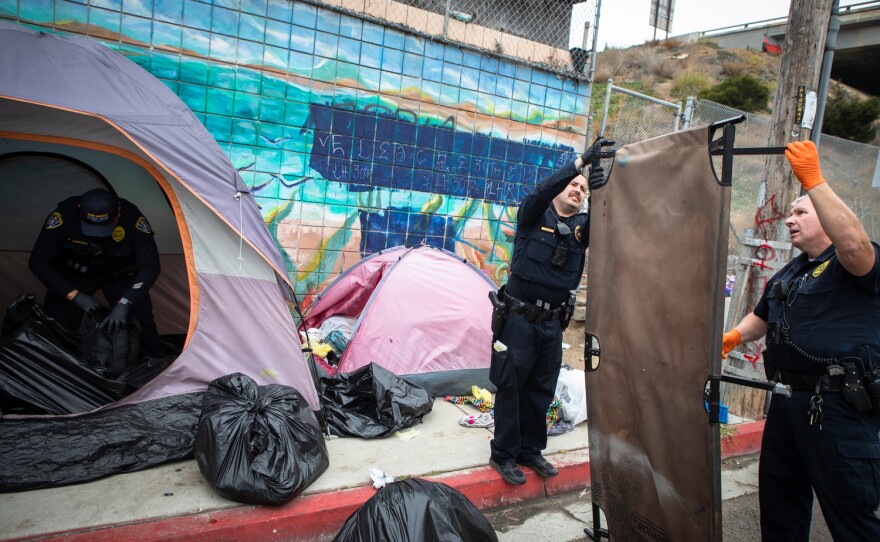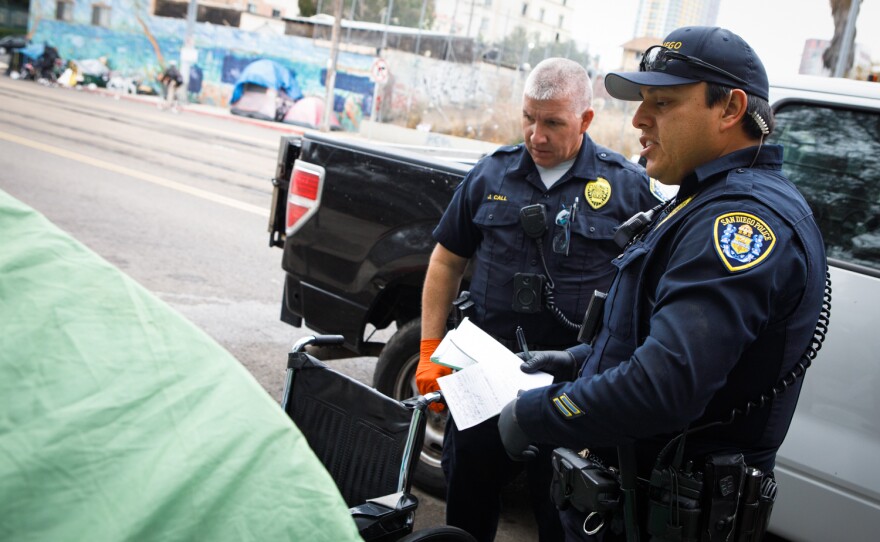It took less than 10 minutes earlier this month for a San Diego court to dismiss tickets given to two unhoused people for blocking a sidewalk.
The dismissals came down to procedural errors, and they mark another development in Mayor Todd Gloria’s effort to hold unhoused people accountable for refusing to go to a shelter.
Both unhoused San Diegans were represented for free by local attorney Coleen Cusack. She said these two cases are the first to go to trial in infraction court since San Diego police stepped up enforcement of encroachment — a city law that was intended to prohibit trash cans from blocking a sidewalk but has since been co-opted to target unhoused people.
Commissioner Rosy Meyerowitz, an unelected attorney given the power to decide infraction court cases, on Jan. 5 dismissed a ticket for encroachment against a 49-year-old man because of a clerical error. The man’s case wasn’t supposed to be scheduled for trial, Meyerowitz said, so she dismissed the ticket “in the interest of justice.”
Later, she dismissed another encroachment ticket against a 38-year-old man after the issuing police officer made a basic error in his testimony — the officer failed to mention how he identified the 38-year-old to write the ticket in the first place.
“The court has to be convinced that this person that the officer is talking about is the (defendant) that has been cited,” said Cusack, adding that it was a simple mistake any attorney would have known to avoid.
Unlike misdemeanors in criminal court, where city attorneys prosecute cases in front of elected judges, police officers are responsible for presenting cases to attorneys in infraction court. It’s a different setting that has produced the same result — police work that targets unhoused people at the taxpayers’ expense and amounts to nothing.
Officials for the city and the police department did not answer any questions about these cases. Instead, they sent a written statement that said officers will continue responding to community complaints and addressing unlawful behavior.
Last year, Gloria told reporters that as long as shelter beds are available, police will enforce laws that prohibit homeless people from blocking a sidewalk or sleeping where they shouldn’t.
“If they don’t want to use them, it’s a free country, I understand that,” he said last June, referring to shelter beds. “But it’s not without consequences.”
A series of inewsource investigations later found possible violations of court orders that demand better treatment of unhoused San Diegans, a dramatic spike in arrests with no criminal convictions to show for it, and a deep disconnect in how best to handle people living on the sidewalk.

On one hand, city officials and Gloria’s staff have said residents complain daily about people in homeless encampments breaking the law or blocking paths of travel, making it dangerous traveling to school and work. The city has a duty to enforce its laws, a spokesperson said.
On the other hand, the city attorney’s office has taken a hands-off approach. A spokesperson said homelessness is best addressed outside the legal system. An inewsource analysis of eight misdemeanor cases last year found that in all but one, city attorneys either agreed with public defenders and judges that a case should be dismissed or asked for the dismissal themselves. But city attorneys don’t prosecute cases in infraction court.
When someone challenges an infraction, the police officer involved is supposed to appear in court to prosecute the case. San Diego County courts saw about 23,500 non-traffic infractions filed in 2021, according to last year’s statistics report. Last year, San Diego police issued at least 815 tickets for encroachment, slightly more than the year before, according to an inewsource analysis.
Police issue an infraction after two encounters with someone for blocking a sidewalk and they refuse to go to a shelter both times — it’s part of the city’s court-ordered progressive enforcement model, which ends in an arrest after the fourth refusal.
Homelessness is a national crisis fueled by skyrocketing rents, stagnant wages and low vacancy rates, and cities from Florida to California have been criticized for criminalizing people existing in public.
According to a report from the National Homelessness Law Center, police around the country have continued to step up enforcement of laws that target unhoused people — such as sitting, lying down or sleeping in public — every year since the group started tracking in 2006.
There is no right to a court-appointed attorney in infraction court, so it’s rare for someone to take an infraction to trial, and even more rare for a defendant to have an attorney.
But Cusack, the local attorney who donates her time for these cases, sees herself as a “social justice transformer” and said she feels compelled to fight for people who are being punished for existing in public.









